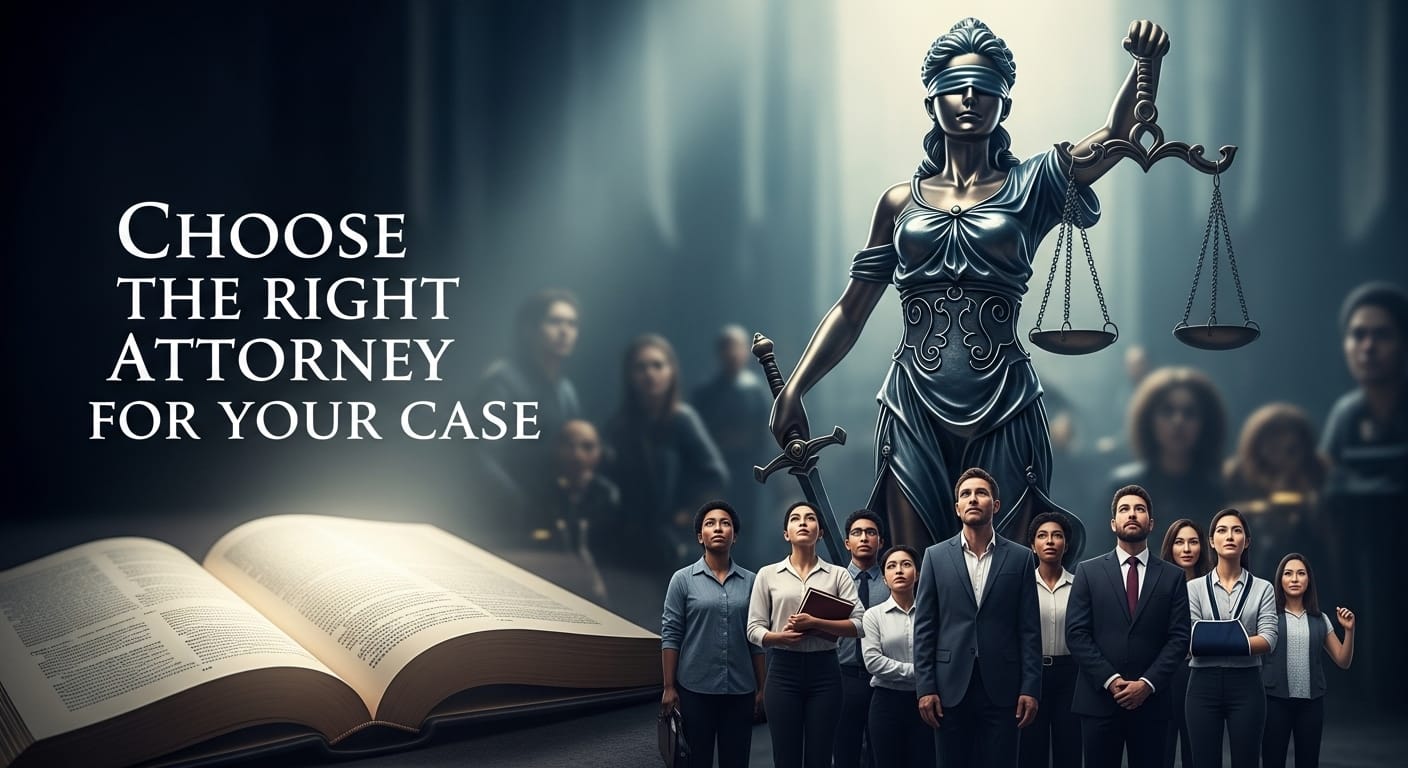Choosing the right attorney is a bit like picking a partner for a three-legged race: you want someone who can keep up, knows how to steer clear of obstacles, and won’t trip over their own feet.
After all, when it comes to legal matters, having the right person in your corner can make all the difference between winning that shiny trophy (or, you know, maximum compensation) and face-planting into the mud.
So let’s dive into this process together. I promise it won’t be as boring as watching paint dry—though maybe not quite as exciting as skydiving either. We’ll explore everything from qualifications to personality traits that could mean success or disaster in your legal journey.

Top Takeaways and Key Concepts
Identify your specific legal needs before searching for an attorney to avoid mismatched expertise.
Research potential attorneys through recommendations, reviews, and ratings to gauge reputation and reliability.
Verify qualifications, experience, and case history to ensure the attorney can handle your specific matter.
Schedule consultations to assess attentiveness, communication style, and whether you feel comfortable with them.
Discuss fees upfront and trust your instincts to select an attorney who aligns with your needs.
Summary of This Article
Please Note: This post may contain affiliate links. If you click one of them, we may receive a commission at no extra cost to you. As an Amazon Associate, I earn from qualifying purchases.
This article guides readers through choosing the right attorney effectively. It emphasizes understanding your specific legal needs before starting a search. Researching attorneys using recommendations, reviews, and credentials ensures you find qualified candidates. Scheduling consultations allows evaluation of communication skills, attentiveness, and personal comfort. Transparent discussion of fees prevents financial surprises, and trusting your instincts helps finalize the best choice. Following this systematic approach increases the likelihood of selecting an attorney who can navigate legal challenges successfully.
Understand Your Legal Needs

Before you even think about Googling “best lawyer near me” (which might lead you down an internet rabbit hole filled with cat videos), take a moment to clarify what type of legal help you need. Are you dealing with personal injury? Divorce? Or perhaps you’re trying to navigate the treacherous waters of contract disputes?
Each area of law has its own set of rules and nuances. For example, hiring an attorney who specializes in criminal defense for your upcoming divorce would be like asking a chef to fix your car—great at one thing but completely out of their element!
By understanding your specific needs first, you’ll save time and avoid unnecessary headaches later on.
Research Potential Attorneys
Once you’ve pinpointed your needs, it’s time for some good old-fashioned research. Think of it as preparing for a scavenger hunt; you’re looking for clues that will lead you to the perfect attorney.
Start by asking friends or family if they have any recommendations—or better yet, if they have any horror stories about attorneys they’ve used in the past (always helpful!).
Next, check online reviews and ratings. Websites like Avvo or Martindale-Hubbell can provide insights into lawyers’ reputations based on real client experiences.
Just remember: don’t judge a book by its cover—or an attorney solely by their five-star rating! Sometimes people leave glowing reviews because they were dazzled by fancy office decor rather than actual results.
Check Qualifications and Experience
Now that you’ve gathered some names, let’s dig deeper into qualifications. You wouldn’t hire someone without checking their resume for job experience—so why would you do that with an attorney? Look for education history (law school rankings matter!), years practicing law, and any special certifications related to your case type.
Moreover, consider whether they’ve handled cases similar to yours before. An attorney who’s successfully navigated personal injury claims is more likely to understand nuances than one who typically focuses on tax law—unless you’re suing Uncle Sam over something ridiculous (in which case, good luck!).
Schedule Consultations
Alright! You’ve narrowed down your list and now it’s time for consultations—think of these meetings as speed dating but with less awkwardness (hopefully). Most attorneys offer free initial consultations where you can discuss your case and get a feel for whether they’re right for you.
During these meetings, pay attention not just to what they say but how they say it. Do they listen attentively? Are they genuinely interested in helping you? Or are they distractedly scrolling through their phone while nodding along?
A good attorney should make you feel heard—and hopefully not give off vibes akin to a used car salesman!
Evaluate Communication Style
Speaking of communication—it’s vital! You want an attorney who communicates clearly without resorting to jargon that makes them sound like they’re speaking Klingon. The last thing anyone needs during stressful legal proceedings is confusion piled on top of anxiety.
Ask yourself: Can this person explain complex concepts simply? Do they return calls or emails promptly? If communication feels stilted during those early meetings, imagine how frustrating things could get once you’re deep into negotiations or court appearances!
Trust Your Gut Feeling
Let’s see… after all this searching and interviewing, we arrive at perhaps one of the most important steps: trusting your gut feeling. If something feels off—even if every credential checks out—it might be worth reconsidering.
Remember: working closely with an attorney means sharing sensitive information about yourself; trust is essential!
On the other hand, if someone makes you feel comfortable while tackling tough topics head-on—like discussing potential outcomes—you may have found “the one.” It’s kind of like finding that perfect pair of shoes; sometimes comfort wins over style!
Discuss Fees Upfront
Okay folks—we’re getting down to brass tacks here: money matters! Before signing anything or getting too cozy with your chosen lawyer, ensure you’re clear about fees upfront. Some attorneys charge hourly rates while others work on contingency fees (meaning they’ll take a percentage only if you win).
Don’t shy away from asking questions about costs—including hidden fees or expenses—and make sure everything is laid out transparently so there are no surprises later on! It’s better than discovering halfway through litigation that financing options involve selling one kidney instead of two!
Make Your Decision
Finally—the moment you’ve been waiting for! Take some time after consultations before making your decision; reflect on each candidate’s strengths and weaknesses based on everything we’ve covered today.
In conclusion—and I promise I’m wrapping up now—you’ve got this! Choosing the right attorney doesn’t have to be overwhelming if approached systematically—with humor sprinkled throughout because life is too short not to laugh even when dealing with serious matters!
Suggested External Resources:
Finding Legal Help
https://www.findlaw.com/hiring-a-lawyer.html
How To Choose a Lawyer
https://www.nolo.com/legal-encyclopedia/how-choose-lawyer-29818.html
Understanding Legal Fees
https://www.lawyers.com/legal-info/fees-and-billing/
Frequently Asked Questions
Why is it important to identify my legal needs before choosing an attorney?
Identifying your legal needs ensures you select an attorney with the right specialization. Different cases, such as family law or criminal defense, require distinct expertise.
How can I research potential attorneys effectively?
Start with personal recommendations, then review online ratings and client feedback. Use trusted legal directories to assess reputation, experience, and professional standing.
What qualifications should I look for in an attorney?
Verify education, licensing, and relevant experience. Check whether the attorney has successfully handled cases similar to yours and maintains good standing with the state bar.
Why are consultations important before hiring an attorney?
Consultations allow you to evaluate the attorney’s communication style, attentiveness, and overall compatibility. They also help you understand how they plan to handle your case.
How should I evaluate an attorney’s communication style?
Choose someone who listens carefully, explains clearly, and responds promptly. Good communication builds trust and reduces stress throughout your legal process.
When should I discuss legal fees with an attorney?
Discuss fees at the beginning to avoid misunderstandings. Clarify whether charges are hourly, flat-rate, or contingency-based, and confirm all costs in writing.
What role does intuition play when selecting an attorney?
Your instincts matter. If an attorney makes you feel comfortable and confident, it’s a strong sign they’re the right fit for representing your legal interests.

Kevin Collier is a legal expert passionate about simplifying complex legal concepts for everyday individuals. With a focus on providing clear, practical information, he covers a wide range of topics, including rights, responsibilities, and legal procedures. Kevin aims to empower readers with the knowledge they need to navigate the legal landscape confidently, ensuring they can make informed decisions regarding their legal matters. Through insightful articles and easy-to-understand resources, he helps demystify the law, making it accessible to all.










